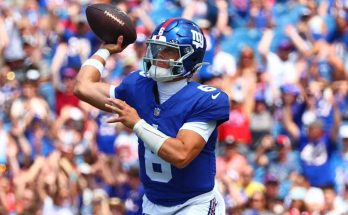For a man who spent his entire 18-year NBA career devoted to a single franchise, whose on-court mastery made him the Indiana Pacers’ all-time leader in points, assists, and steals, and whose signature clutch performances elevated the drama of playoff basketball, Reggie Miller being named one of Time magazine’s 100 most influential people in sports is more than just recognition. It is affirmation—proof that his legacy is not only enduring but generational. This honor cements what many already knew: Miller’s influence extends far beyond the three-point line, and his imprint on basketball, media, and community is indelible.
As a player, Reggie Miller revolutionized the role of the perimeter shooter. When he retired in 2005, he held the NBA record for the most career three-pointers made—a record that has since been broken, but one that defined an era. His form, confidence, and timing from deep inspired a generation of shooters and signaled a shift in how the game was played. What set Miller apart wasn’t just his range; it was his timing. He had an uncanny ability to strike when the pressure was at its highest.
Nowhere was this more evident than in one of the most iconic moments in NBA history: Game 1 of the 1995 Eastern Conference Semifinals. With less than 20 seconds left, Miller scored eight points in nine seconds against the New York Knicks at Madison Square Garden, stunning the crowd and delivering what is still considered one of the greatest clutch performances ever. His antics afterward—including the now-famous “choke” gesture directed at Spike Lee—only added to the legend. It wasn’t just about the points; it was about the drama, the defiance, the performance.
Throughout his 18 seasons with the Pacers, Miller averaged 18.2 points per game, made five All-Star appearances, played in the 2000 NBA Finals, won an Olympic gold medal in 1996, and was later named to the NBA’s 75th Anniversary Team. He was inducted into the Naismith Memorial Basketball Hall of Fame in 2012. But statistics only tell part of the story. His legacy was built in the fourth quarters, in the playoff rivalries, and in the silent belief from fans that if the ball was in Reggie’s hands, magic was still possible.
After retirement, Miller seamlessly transitioned into the broadcast booth, becoming one of the most recognized voices in NBA commentary. As a longtime analyst with Turner Sports, he provided insights that only someone of his experience and intelligence could offer. His commentary style—blunt, direct, and sometimes polarizing—made him a staple of playoff basketball broadcasts. He added color and context to the game, often educating viewers with subtle observations about movement, decision-making, and psychology on the court.
But Reggie Miller’s post-playing career didn’t stop with commentary. In 2025, he took another monumental step by returning to the Indiana Pacers organization as a co-owner and executive. This wasn’t a ceremonial role or a nostalgic reunion—it was a transformative moment. Miller stepped into the leadership structure of the team that had defined his playing career, ready to influence its future from the top down. His responsibilities would span across business development, player mentorship, branding, and organizational culture—not only for the Pacers but also for their WNBA and G League affiliates.
This evolution—from star player to broadcaster to team executive—embodies the very definition of influence. His journey presents a modern blueprint for athlete empowerment: not just being a face of the franchise, but having a seat at the table where decisions are made. Miller’s role isn’t about reminiscing on the past; it’s about investing in the future, and Time’s recognition speaks directly to that forward-looking impact.
Beyond the hardwood and boardroom, Reggie Miller has consistently dedicated himself to community work. Whether through basketball camps, charity events, or advocacy for youth development and education, he’s remained an active figure in giving back—particularly in Indiana, where he is nothing short of a hometown hero. Personal experiences, including his sister Cheryl’s battle with cancer, also pushed him into health-related advocacy and fundraising. These efforts are not for headlines—they are rooted in loyalty and care for the people and the places that shaped him.
Recently, Miller announced plans to launch the Reggie Miller Basketball Leadership Institute, a program focused on developing not just athletes, but future leaders. Aimed at high school and college players, the program is designed to teach life skills, emotional resilience, and community values alongside basketball fundamentals. It reflects Miller’s belief that sports are not just games—they are platforms for personal transformation.
In the media landscape, his voice continues to be a force. As the NBA’s media rights shifted, Miller signed on to become a lead analyst for NBC’s new broadcast team, positioning him to be one of the most influential commentators as the league moves into its next era of televised coverage. With nearly two decades of broadcast experience already under his belt, he brings both gravitas and relatability to every game he covers.
And then there’s the nostalgia, still alive and well. In 2025, during a heated playoff series between the Pacers and the Knicks, the rivalry was revived in dramatic fashion. Young Pacers star Tyrese Haliburton famously mimicked Miller’s “choke” gesture after a clutch win at Madison Square Garden. When Miller showed up courtside in all black for a Game 6 showdown—signaling the symbolic “funeral” of the Knicks—it reminded everyone that, even in retirement, his aura could still shape narratives and stir emotion. His presence isn’t just symbolic—it’s catalytic.
That moment, among others, captured the essence of Reggie Miller’s enduring relevance. Unlike many athletes who fade from public consciousness after their playing days, Miller has stayed at the heart of the conversation—not because he seeks it, but because the game continues to revolve, in part, around his influence. From game-winner to game-caller to game-changer, he has played every role with authenticity and intensity.
What makes Miller’s story even more compelling is its consistency. He didn’t bounce from team to team chasing rings. He didn’t fade quietly into retirement. He didn’t rebrand himself for every new role. He stayed true to himself and to Indiana. That type of loyalty, especially in modern sports culture, carries weight. His influence is rooted in trust and legacy, not in trends or algorithms. It’s why he resonates with both older fans who watched him light up the Garden, and younger ones who know him as the passionate voice on national broadcasts or the executive rebuilding the Pacers brand.
Time’s selection of Reggie Miller as one of the 100 most influential people in sports is not just a nod to his past glory, but a celebration of his enduring impact. In an age where influence is often confused with visibility, Miller represents something more grounded and lasting. His impact spans decades, yet he remains as relevant as ever—not by chasing the spotlight, but by continuing to earn it through action, leadership, and integrity.
He’s a player who redefined shooting before the era of analytics. He’s a broadcaster who brings unfiltered honesty to the mic. He’s an executive shaping the next generation of athletes. And he’s a leader proving that greatness doesn’t end with retirement—it evolves.
Inclusion in Time’s prestigious list marks a milestone, yes, but also a reminder: Reggie Miller’s story isn’t finished. His influence continues—on the court, in the community, behind the camera, and now, in the boardroom. And as long as the game of basketball keeps evolving, it will do so under the shadow—and the example—of legends like him.



